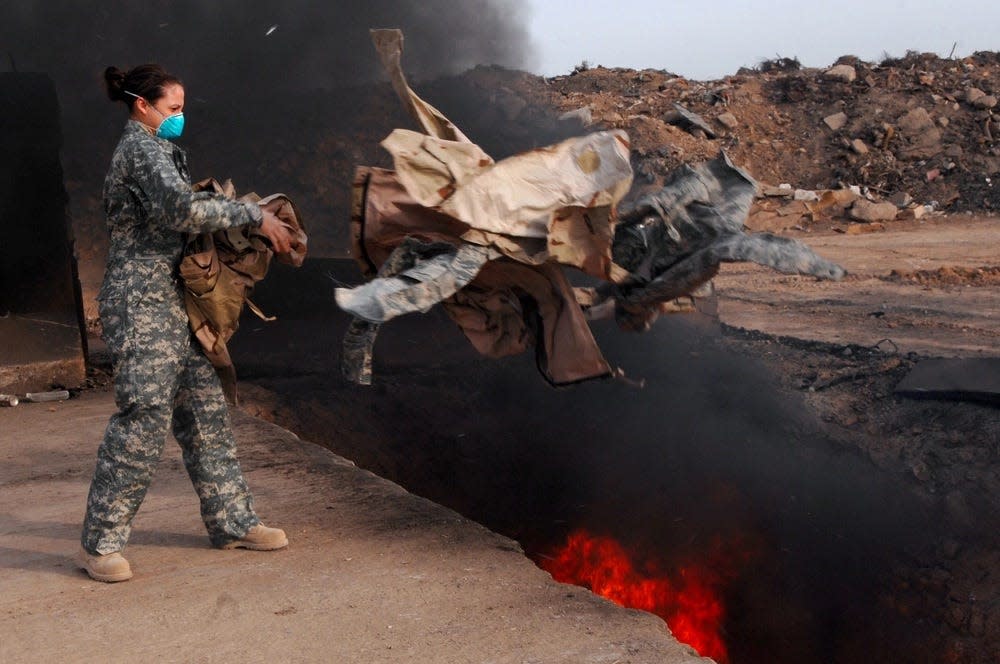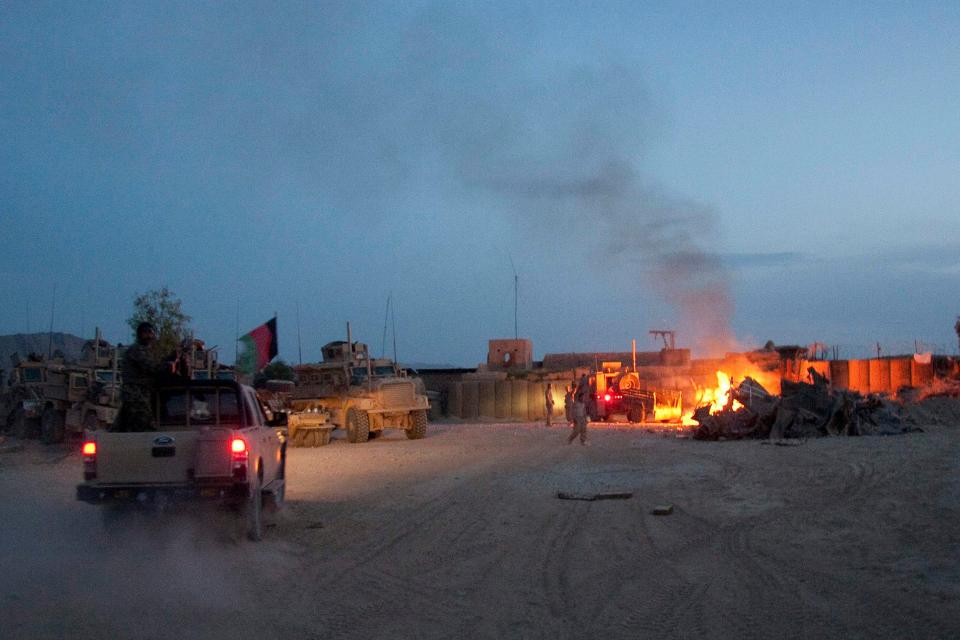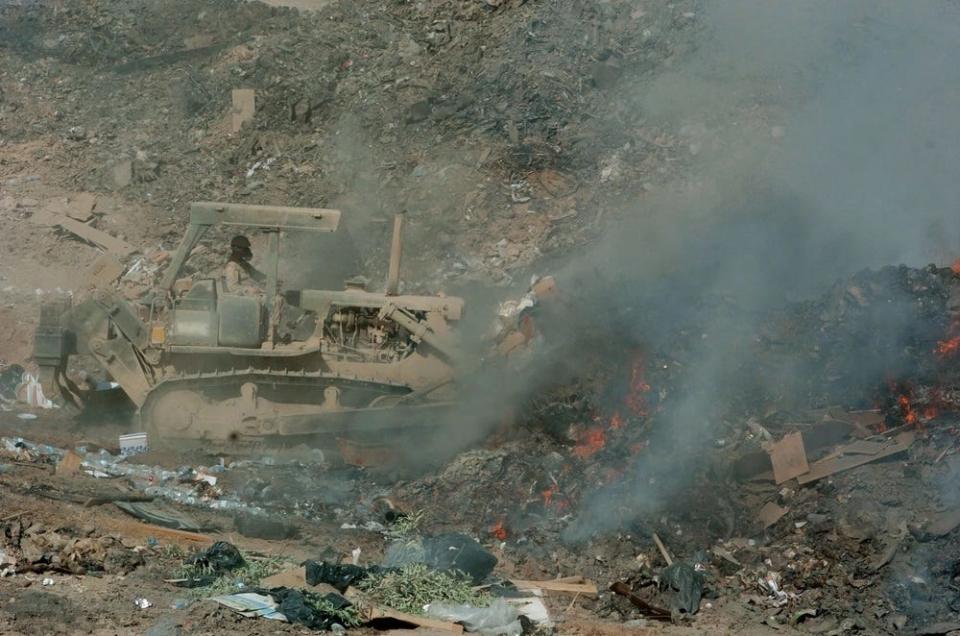What Cumberland County veterans need to know about new toxic exposure act

- Oops!Something went wrong.Please try again later.
A new law will expand health care coverage to millions of veterans exposed to burn pits and other military toxins.
According to the Department of Veterans Affairs, military burn pits were used in Iraq and Afghanistan to dispose of things like chemicals, rubber, plastics and medical and human waste among other items.
The Sergeant First Class Heath Robinson Honoring Our Promises to Address Comprehensive Toxics bill, known as the PACT Act, was signed into law by President Joe Biden on Aug. 10 after first failing and then passing in the Senate 86-11 last month.
Previously: Senate passes PACT Act to help US vets exposed to burn pits, heads to Biden for signature
Read this: Tillis, Klobuchar introduce legislation to help troops exposed to toxic burn pits
Here's what you need to know about the new law
In his remarks before signing the act into law, Biden said the 1991 Agent Orange Act for veterans exposed to the toxic substance in Vietnam “laid the groundwork” for the newest law. Biden was a co-sponsor of the Agent Orange Act.
That said that when he was vice president, he visited Iraq more than 20 times and saw the burn pits.
“You could actually see some of it in the air — burn pits the size of football fields that incinerated wastes of war, such as tires, poisonous chemicals, jet fuel, and so much more I won’t even mention,” Biden said.
The pits, the president said, were less than half a mile from where soldiers slept or ate.
"Toxic smoke, thick with poison, spreading through the air and into the lungs of our troops,” he said.
The president said service members came back from war with “headaches, numbness, dizziness and cancer, and counted his late son Maj. Beau Biden as one of them.
While the VA has acknowledged that smoke from the burn pits “may have short-term and long-term health effects,” there is “conflicting and insufficient research” to show that the health problems result from the pits.
A Rutgers University article identifies one of the school’s professors as being tapped to work with the VA to create an evidence-based database that tracks the different diseases affecting veterans who served in the Gulf wars.
North Carolina senator opposes act
Sen. Thom Tillis, R-North Carolina, who has filed past legislation and hosted a virtual town hall meeting about burn pits, voted against the bill.
In a statement last month, Tillis said he drafted portions of the legislative text that includes the Toxic Exposure in the American Military Act that he filed in 2020, proposing to improve healthcare for veterans exposed to toxic substances.
“Congress has an obligation to ensure the VA can effectively and efficiently implement any comprehensive toxic exposure legislation and, unfortunately, I continue to have reservations about the Department’s ability to do so,” Tillis said.
Tillis said he recently heard VA Secretary Denis McDonough “describe the challenges the VA is facing in meeting current obligations.”

“It’s clear that the Department does not have the capacity to properly implement the PACT Act,” Tillis said. “This legislation will have adverse operational and administrative impacts, and I remain concerned that it will result in increased wait times, delays in receiving care, and a substantial increase in the claims backlog.”
Shortly after Biden signed the act into law, McDonough issued a statement saying the VA is ready to implement the act.
“We at VA will stop at nothing to make sure that every veteran and every survivor gets the PACT Act-related care and benefits they deserve,” he said.
Veteran advocacy groups like the Veterans of Foreign Wars, Disabled American Veterans, American Legion and Association of the U.S. Army have backed the act.
What does the act do
The Iraq and Afghanistan Veterans of America advocacy group estimates that up to 3.5 million veterans have been exposed to burn pits and said the VA previously would not presume that symptoms presented by veterans exposed to burn pits are due to service.
The law no longer requires veterans to prove that burn pit exposure caused their illness.
According to the VA, the new law now expands VA health care eligibility to Vietnam, Gulf War and post 9/11 veterans with toxic exposure.

The act, according to the VA, adds more than 20 new presumptive conditions for burn pits and other toxic exposures, meaning the VA now will presume the conditions were caused by the veterans’ service.
According to the VA, it is determining veterans and service members have been exposed to burn pits and other toxins if they deployed to the following locations after 9/11:
• Afghanistan
• Djibouti
• Egypt
• Jordan
• Lebanon
• Syria
• Uzbekistan
• Yemen
• The airspace above any of these locations
The VA is also recognizing veterans who deployed to the following locations on or after Aug. 2, 1990:
• Bahrain
• Iraq
• Kuwait
• Oman
• Qatar
• Saudi Arabia
• Somalia
• The United Arab Emirates
• The airspace above any of these locations
According to the Whitehouse, the new law also means that a surviving spouse with two children is entitled to a $2,000 monthly stipend if their husband or wife died from toxic exposure.
The act also includes the Marines who were exposed to water contamination at Camp Lejeune, North Carolina, from 1953 to 1987.
Previous covereage: U.S. to pay millions for Agent Orange claims
Vietnam and Afghanistan: Two generations, two wars, one aftermath
Filing a claim
New claims can be filed online by mail, in person or with help of a trained professional, according to the VA.
Veterans whose previous disability claims were denied may now submit a supplemental claim if their condition is considered presumptive.
VA officials said they will start to process PACT Act-related benefits in January 2023 and must wait for funding approval in Congress before the claims are processed.
After the PACT Act was signed into law, the VA issued an announcement telling veterans to beware of scammers targeting them for their benefits or attempting to submit claims on their behalf. Officials said veterans should not provide personal information online or on the phone or click ads.
VA officials said VA-accredited representatives, and Veteran Service Officers can help veterans apply for the benefits at no cost and that the VA never charges for processing a claim.
The Cumberland County Veterans Services Department also provides advice on benefits and assists veterans with filing and tracking claims.
Veterans with specific questions may also call 800-698-2411.

Local veteran organizations are also encouraging veterans to register on the VA’s Airborne Hazards and Open Burn Pit Registry which tracks the data and allows the VA to “better understand the potential health effects of exposure to airborne hazards during military service.”
Staff writer Rachael Riley can be reached at rriley@fayobserver.com or 910-486-3528.
This article originally appeared on The Fayetteville Observer: VA details how veterans can now file toxic exposure claims

